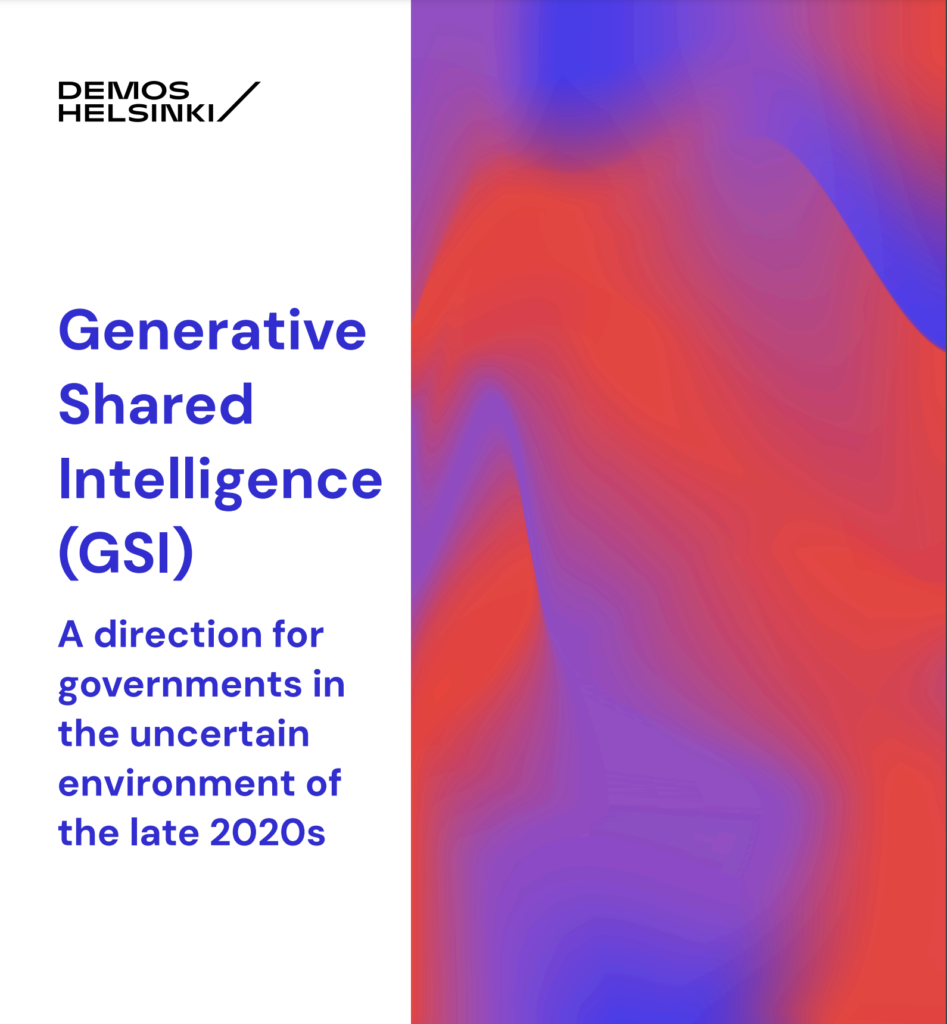The notion of a "polycrisis" has become a defining feature of contemporary governance, and traditional administrative methods are increasingly inadequate. In this publication, Professor Sir Geoff Mulgan's concept of "Generative Shared Intelligence" offers a model for addressing multidimensional problems in governance, emphasising the need for more flexible and collaborative structures designed for the sole purpose of sharing intelligence.
Governments don’t need more data. Data has been more abundant than ever. Yet, there is still a crucial gap in synthesis, whereby governments are not set up in ways that allow the creation and sharing of knowledge — let alone the important process of synthesising information from multiple sources to generate relevant actions. In this publication, Professor Sir Geoff Mulgan’s concept of “Generative Shared Intelligence” (GSI) offers a model for addressing multidimensional problems in governance, emphasising the need for more flexible and collaborative structures designed for the sole purpose of sharing intelligence.
Dynamic contexts as the new normal
Governments are no strangers to complexity and unpredictability. The notion of a “polycrisis,” where multiple crises overlap and intensify, has become a defining feature of contemporary governance. Traditional administrative methods, designed for more stable and predictable environments, are increasingly inadequate. Governments must now adopt dynamic and adaptive strategies to manage both immediate crises and long-term systemic shifts.
The interconnected nature of global challenges necessitates a dual focus on rapid response and sustained strategic planning. This requires governments to be flexible, avoiding the pitfalls of siloed thinking and rigid bureaucratic processes. The ability to pivot quickly and effectively reallocate resources is crucial in this volatile landscape.
The central role of intelligence
Intelligence, in its broadest sense, is more critical than ever. Historically associated with security, intelligence must now encompass all facets of governance, from health and education to economic policy and environmental management. Effective governance relies on integrating diverse forms of intelligence, including data, scientific evidence, tacit knowledge, and citizen insights.
During the COVID-19 pandemic, the importance of real-time health data, predictive models, and public insights became starkly apparent. Similarly, addressing issues like climate change and economic inequality requires a holistic approach to intelligence, where various types of knowledge are synthesised to inform decision-making.
A philosophy of open, engaged government
A key tenet of GSI is the commitment to sharing intelligence widely, both within and outside government. While some intelligence must remain confidential for security reasons, most should be disseminated to enhance collaboration and innovation. This approach includes open data initiatives, the curation of living evidence maps, and the use of collective intelligence to mobilise societal expertise.
Sharing intelligence nurtures a more transparent and participatory form of governance. It enables governments to tap into a broader range of knowledge and perspectives, facilitating better decision-making and increasing public trust.
Generative approaches to governance
GSI emphasises the need for governments to be generative — constantly producing and innovating in response to changing circumstances. This involves:
- Generating new solutions: Continuously developing new responses to emerging challenges.
- Regenerating societies: Revitalising communities and economies to prevent stagnation.
- Regenerating the environment: Implementing sustainable practices to heal and preserve natural ecosystems.
- Regenerating politics: Restoring public trust and capability in democratic institutions.
GSI could also integrate human and artificial intelligence, focusing on synergy rather than replacement.
Operationalising generative shared intelligence
To implement GSI, governments can adopt a range of strategies:
- Intelligent centres of government: Establishing agile, networked structures at the core of government to orchestrate knowledge and resources effectively.
- Whole-of-Government action: Creating horizontal clusters for key missions, such as achieving net zero emissions or pandemic response, breaking down traditional silos.
- Modernised public finance: Linking financial practices to impact, using data and investment models to track and optimise outcomes.
- Digital infrastructures: Building standardised, flexible digital systems to support efficient governance and public services.
- Mesh organisation: Forming partnerships across government tiers and sectors, with shared responsibilities and mutual accountability.
- Innovation and learning: Embracing continuous learning and experimentation to discover better solutions and inform policy.
- A relational state: Enhancing collaboration with citizens, leveraging lived experiences and insights to improve public services.
- Richer public engagement: Utilising a wide array of participatory methods, from budgeting to citizens’ assemblies, to develop inclusive decision-making.
- Fit-for-purpose institutions: Continuously adapting and designing institutions to meet contemporary challenges effectively.
- Risk management and foresight: Proactively scanning for potential crises and opportunities.
- Synthesis and holistic thought: Integrating diverse forms of intelligence to guide comprehensive and informed action.
- Skills and training: Investing in the skills and capacity of government officials to enhance decision-making and implementation.
Renewal of democracy through shared intelligence
The principles of GSI extend beyond practical governance to the broader context of democratic renewal. Modern democracies face declining trust and engagement, partly due to outdated structures and processes. By incorporating GSI, democracies can become more participative and responsive, involving citizens more deeply in governance.
This involves leveraging tools like participatory budgeting, citizens’ assemblies, and AI-driven consensus-building platforms to engage the public and integrate their insights into policymaking. Such approaches not only enhance democratic legitimacy but also ensure that diverse perspectives are reflected in governmental decisions.
Balancing complexity and simplicity
While GSI advocates for sophisticated and integrated methods, it also underscores the importance of simplicity. Excessive complexity can hinder coordination and effectiveness. Thus, shared intelligence methods must be paired with strategies for simplification, standardising protocols, and reducing friction in government-citizen interactions.


Loops for Wisdom
Publication
May 4, 2021
We need less data, more conversation
Post
July 25, 2021
The Imaginary Crisis (and how we might quicken social and public imagination)
Publication
April 8, 2020
A time to build – shaping the next generation of public institutions
Post
December 19, 2024
Climate-proofing Nordic security
Project
February 13, 2026
Master class: Institutionalising for impact
Event
February 13, 2026